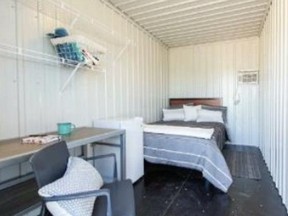
Chatham-Kent council has voted to replace the municipally run Victoria Park Place homeless shelter with 50 transitional cabins.
Advertisement 2
Article content
A request for proposals has been issued, and municipal staff will bring final costs and recommended locations back to council for approval.
Article content
Josh Myers, director of housing services, gave a presentation to council during the Jan. 15 meetings.
“The cabins would be treated the same as any other municipally owned housing,” he said.
Municipal staff would operate the site, providing 24/7 case management focusing on securing community housing, life skills training and community referrals.
Rules and expectations will be similar to other municipal housing, a staff report said.
“Clients would be expected to respect their neighbors’ reasonable right to enjoy their unity. Pets and spouses would be permitted,” it said. “A no-guest policy would be maintained as this is a program that helps vulnerable people and maintaining their privacy is important.”
Advertisement 3
Article content
A privacy fence and controlled entry is also proposed. Food would be provided on programming days, but it is expected clients would use their social assistance benefits to buy what they need to better prepare for their next move into private or public housing.
Victoria Park Place, on Murray Street in Chatham, opened in June 2022 amid concerns from area residents.
About 120 people who have experienced homelessness, provided input on both the cabin model and the congregation shelter model. More than 90 per cent supported cabins.
The Canadian Mental Health Association and Chatham-Kent Community Health Centers have agreed to continue providing onsite services and system navigation.
Staff will work with their clients to develop case plans, create goals and maintain a housing focus.
Advertisement 4
Article content
Myers acknowledged the units are small – about 100 square feet – but stressed they are transitional, assisting those with no other option.
“Rightfully, many in the community will question the suitability of this style of housing,” he said. “(It) doesn’t have to be someone’s forever home. It can be a second stage and part of their journey back to stability and wellness.”
Families needing emergency shelter would continue to be entertained to area motels, Myers added.
Estimated capital cost of the fully furnished cabins, including installation, is about $2.6 million, the report said. Operating costs, including staffing and security, are pegged at about $2.4 million.
Since it is a self-contained unit, occupants would be charged a small fee, coming from their shelter benefits. Estimated revenue of $234,000 a year would go toward program costs.
Advertisement 5
Article content
One contractor, NOW housing, has expressed confidence it can meet a 50-cabin order from Chatham-Kent within six months of signing a purchase agreement.
“NOW housing will be encouraged to submit a proposal,” the report said. “Other manufacturing companies that produce this type of housing should also be encouraged to submit proposals to the RFP.”
Chatham Coun. Marjorie Crew said she believes the cabin model is preferable, noting having social services readily available is also key.
“It’s traumatic enough to be homeless,” she said. “But this gives you dignity, it humanizes people. And gives them that opportunity to recover from homelessness.”
Article content